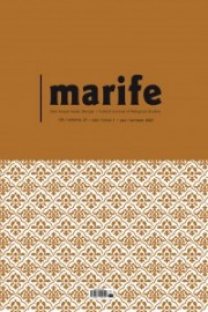“De ki: Tevrat’ı Getirin de Okuyun” Tefsirde Kitab-ı Mukaddes’ten Nakilde Bulunmanın Meşruiyeti Bağlamında Bikâî-Sehâvî Polemiği
Tefsirlerde yabancı kökenli bilgilerin, özellikle de Yahudi ve Hıristiyan kültürüne dayanan şifahî rivayetlerin nakli, kökleri ilk dönmelere uzanan çeşitli meşruiyet tartışmalarına sebep olmuştur. Meselenin diğer bir boyutunu ise onların kutsal kitaplarıyla meşgul olmak ve/veya bunlardan doğrudan nakilde bulunmak, bir başka deyişle kitabî bilgilerin nakli oluşturmaktadır. Bunun meşruiyeti ile ilgili de çeşitli tartışmalar yapılmış ve bu tartışmalar içerisinde bunun caiz olduğunu düşünenler kadar, mekruh hatta haram olduğuna hükmedenler bile olmuştur. IX. hicri asra gelindiğinde ise problem etrafında çok ciddi polemikler meydana gelmiş ve iki uç görüş ortaya çıkmıştır. Bu makale, dönemin iki önemli ismi Bikâî (ö. 885/1480) ile Sehâvî (ö. 902/1497) arasında, söz konusu probleme ilişkin cereyan eden bir polemiği ele alacaktır
“Say: Bring the Torah and Recite It” al-Biqa’i -al-Sakhawi Polemics in the Context of Legitimacy of Quoting from the Bible in Quran Exegesis
The quotation of some non-Islamic traditions, particularly those basing on Jewish and Christian cultures, in Quran exegesis has raised some legitimacy debates which may be traced to the first ages. On the other hand, being interested in and/or citing from their Scriptures constitutes the other part of the problem. Some arguments have been made on the legitimacy of such citations and consequently there have been those who regard this as lawful and those who think that it is reprehensible or even illegitimate. In the nineth century of the Hijrah, many serious polemics appeared on the problem and two extreme thoughts were seen. This paper treats a debate on the problem between two prominent figures of the century, al-Biqa’i (d. 885/1480) and al-Sakhawi (d. 902/1479)
Keywords:
Exegesis, Israiliyyat, the Bible the 9th Century of the Hicrah,
- Yayın Aralığı: 2
- Başlangıç: 31.05.2001
- Yayıncı: Yediveren Kitap
Sayıdaki Diğer Makaleler
Vahdet-i Vücud ve Vahdet-i Şühud Açısından Müşâhede ve Rüyet Kavramları Üzerine Bir Değerlendirme
Tarih ve Dilbilimi Kaynakları Işığında Kur’ân’ın 10 Kıraati, Ahmed Aliyyul İmam
Yemenli öykücülerden hemdân zeyd demmâc'ın yolcu adlı öyküsü
Hadis Rivâyetinde Telkin Zabt İlİşkisi ve Telkin Yoluyla Yapılan Tahrifler
